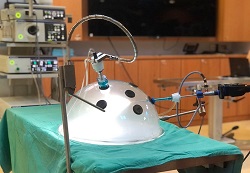 24 March 2021 - A novel drug delivery technique that could extend the lifespans of advanced cancer patients has been successfully introduced in Singapore, at the National University Hospital - NUH and National University Cancer Institute, Singapore - NCIS — and for the first time in Asia.
24 March 2021 - A novel drug delivery technique that could extend the lifespans of advanced cancer patients has been successfully introduced in Singapore, at the National University Hospital - NUH and National University Cancer Institute, Singapore - NCIS — and for the first time in Asia.
Known as pressurised intraperitoneal aerosol chemotherapy (PIPAC), the procedure targets cancers within the peritoneal cavity in the abdomen, including colon, gastric, and ovarian cancer.
First, chemotherapy, an anti-cancer drug, is converted into fine droplets. A small ‘keyhole’ incision is then made in the abdomen, and the aerosolised chemotherapy solution is injected into the peritoneal cavity at high pressure, where it can act against the cancer cells.
This procedure could extend survival durations of end-stage cancer patients from between six to 12 months, to as much as 19 months, said Professor Jimmy So, Head and Senior Consultant at the NUH’s Division of General Surgery (Upper Gastrointestinal Surgery).
Furthermore, the procedure causes few complications and side effects, allowing patients to preserve their quality of life.
This new approach could prove a recourse for end-stage cancer patients who suffer from numerous side effects and respond poorly to conventional chemotherapy, Prof So added.
He explained that currently, patients with peritoneal metastasis often suffer from severe symptoms, such as intestinal and kidney blockage, which are debilitating and very difficult to treat.
The conventional treatment of systemic chemotherapy – which is typically administered orally or intravenously – has also yielded poor results for such patients, he added.
In addition, side effects are usually severe due to high drug toxicity.
For such patients, PIPAC could be a better, safer treatment option.
First, because it is injected into a targeted space, less of the drug is needed, and very little of it is able to escape into the blood system. This means there is less toxicity and fewer adverse side effects to contend with.
The chemotherapy is also able to be distributed evenly within the abdominal cavity, and with a higher drug penetration, allowing it to more effectively kill cancer cells.
There are other advantages as well. For instance, as it is a minimally invasive procedure, it can be carried out multiple times. The progress of the cancer can also be tracked through a camera system called a laparoscope during the procedure, to assess if the tumour is expanding further.
Currently, NUH is also the main training centre for PIPAC in Asia.
The team is now working on first-in-human trials to see if PIPAC can be combined with systemic immunotherapy for even better results, he added.
“Peritoneal metastasis is a common problem in many patients with advanced cancer. Unfortunately, the current treatment results are unsatisfactory,” said Prof So.
“However, PIPAC is a safe, promising treatment for this disease, that we hope can bring higher expectations and hope for our patients with advanced cancer.”
Related: